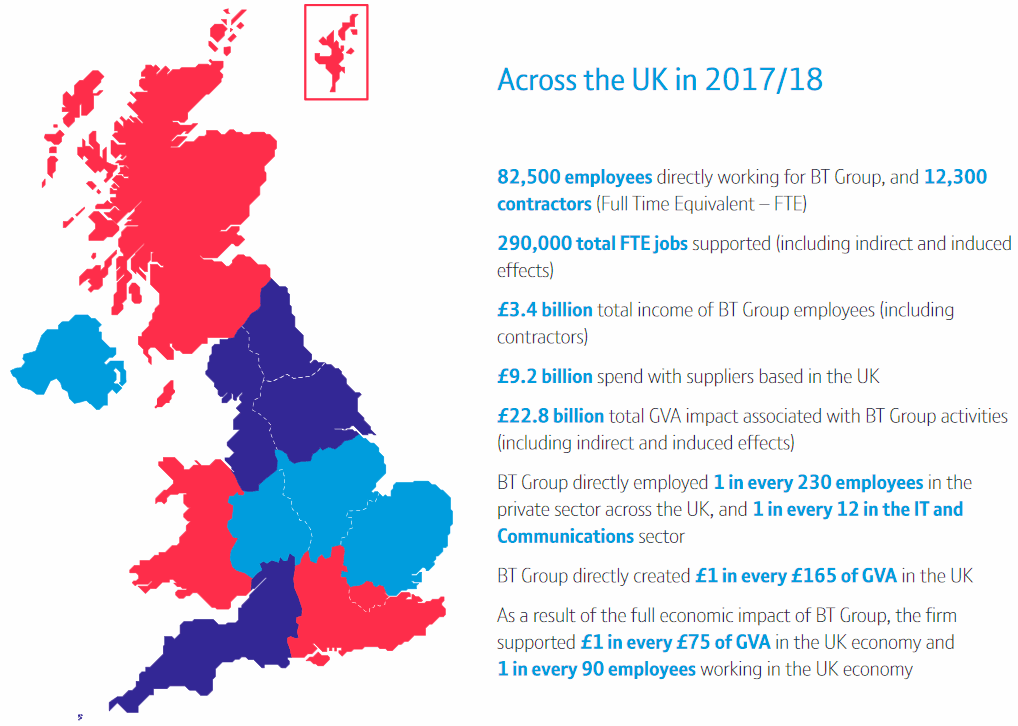Report Claims BT Generates £1 in Every £75 Produced in the UK
A new report from Hatch Regeneris, which was commissioned by the BT Group, has estimated that the telecoms and broadband ISP giant generated a £22.8 billion contribution to the UK economy (expressed as GVA – Gross Value Added) during the 2017/18 financial year (down from £23.1bn in 2016).
The report also notes that in the last financial year BT Group paid £1.1bn in taxes and were the 5th highest tax contributor in the United Kingdom (behind banks including HSBC, Lloyds, Barclays and RBS – according to PWC), although we should point out that the impact of this tax contribution has not been assessed in this report.
Otherwise the £22.8bn figure mentioned above appears to combine the direct, indirect and induced impacts of BT Group’s activities and spending across all of their divisions (e.g. Openreach’s fixed line infrastructure, BT Consumer, EE’s mobile network etc.).
Advertisement
Overall some of the key highlights include their £9.2bn spend with UK based suppliers (down from £9.3bn in 2016) and the £3.4bn total income (before tax) of their employees (up from £3.2bn in 2016). The full report also includes a region-by-region breakdown of their impact.

By comparison in 2016 the operator reported 81,400 employees directly working for BT Group and 10,600 contractors (Full Time Equivalent), with 259,000 total FTE jobs supported (including indirect and induced effects). Much of the increase in the 2017/18 report has of course come from Openreach’s on-going move to hire thousands more engineers to help support their FTTP and G.fast broadband deployments.
Jane Wood, BT Group UK Nations and Regions Director, said:
“Few companies play as important a role in national, regional and local communities as BT Group. Not only does BT connect friends, families and businesses across the UK, but we also put premium fuel in the tank of the nation’s economy. The report shows that BT generates £1 in every £75 of wealth in the UK.
We’re proud to be one of the UK’s largest private sector employers and investors. Our investments, including the latest 5G mobile technology through our mobile network EE, will ensure the UK continues to be one of the world’s best-connected economies.
With more than 82,500 directly employed people spending their salaries in local businesses, from Shetland to the Scilly Isles, as well as regularly volunteering on activities such as our Barefoot tech literacy programme in schools, our people are at the heart of nearly every community.”
The study also claims that BT Group is the 4th highest payer of UK wages and salaries (out of the PWC Total Tax Contribution of UK FTSE100 companies 2018), the 2nd highest overall distributor of “value” into the UK (i.e. the sum of taxes borne, taxes collected, wages and salaries paid, interest paid, and equity returns etc.) and the highest capex investor. The latter is no surprise given that they have the biggest overall fixed line and mobile network.
Advertisement
Mark is a professional technology writer, IT consultant and computer engineer from Dorset (England), he also founded ISPreview in 1999 and enjoys analysing the latest telecoms and broadband developments. Find me on X (Twitter), Mastodon, Facebook, BlueSky, Threads.net and Linkedin.
« Breakdown of the Phase 2 Wales Superfast Broadband Coverage Plan
Ofcom Warns O2 UK Over Response to Traffic Management Probe »
















































Comments are closed